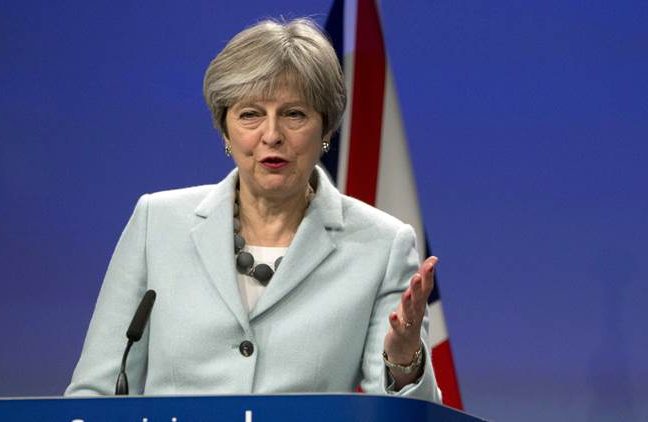By Morak Babajide-Alabi
On Friday, the BREXIT negotiations took a step forward as the EU and the United Kingdom officials made a breakthrough pact in Brussels, the capital city of Belgium and headquarters of the European Union. While the final deal is months away, the announcement has signified the commencement of the second phase of negotiations for UK’s exit from the union.
Although the celebrations for the “feat” achieved on Friday has been very sombre, the importance of the conclusion of this first phase cannot be overemphasised. Theresa May, the UK Prime Minister might not have indulged herself in any political song and dance about the events, she knew deep in her mind that it was a “personal achievement”, as confirmed by the European Council President Donald Tusk.
To the other EU member countries represented by the President of the European Commission Jean Claude-Juncker and other bureaucrats, the success achieved on Friday was commendable. Mr Juncker said: “I believe we have now made the breakthrough we need.” No one should blame them for allowing a little celebration, after what Mrs May said was made possible by little “give and take” on both sides. This might be insignificant in the journey towards the final divorce, but I have a feeling the other 27 member countries seem to know that they have Britain’s balls in their palms.
Going by the details of the agreement, the majority of citizens who voted to leave during June 23, 2016, referendum are biting their fingernails and wondering if they did not make a mistake. Let’s be honest here, most Leave voters did so to protest EU’s liberal hold on immigration and movement within the union. And by extension the UK’s annual huge bill to the union.
Disappointment is a mild word to describe how they felt on learning about the concessions that were made before the Friday deal. Apart from the huge divorce bill, the status quo is maintained as per immigration. EU citizens would still be allowed to reside in the UK “within the specified date”. This was not part of the pre-referendum campaign promises.
The deal would guarantee the rights of EU citizens in the UK and UK citizens in the rest of the EU have the right to stay. It also affirms the rights of their children and those of partners in existing “durable relationships”. While UK courts will preside over enforcing rights over EU citizens in Britain they can still refer unclear cases to the European court of justice for eight years after withdrawal.
When May rose from her bed in London on Friday morning, the minus zero temperature that descended on the UK overnight was not on her mind. Making her way to Brussels to rouse the European bureaucrats out of their beds was the priority. It was not her first visit, but on this occasion, she knows that her Premiership and the future of her country were at stake.
Through the night, May had been in meetings with her “Confidence and Supply” partners – Democratic Union Party (DUP) – to sort out the wordings of the “agreement” she presented to Brussels. She could not afford to miss it this time around. The DUP has kept May in Downing Street so far by aligning with her minority government.
May’s heart would definitely have been in her mouth as the aircraft taxied to a halt in the pre-dawn dash to Brussels. Wondering if the visit would be a flop as that of Monday, May would be more terrified by the unpredictability of the EU negotiators. They are like hawks and there is tendency they would overlook the fact that she had bent backwards to honour the demands of her DUP partners. May also knew she leads a very hard to please political class, a very demanding opposition and the highly sceptical public.
By May’s demeanour, you cannot call her a pushover. Not by any standard. Her utterances and pronouncements while serving as the Home Office Secretary are legendary. She was notorious for talking tough on immigration and police budget cuts in the two-terms of David Cameron’s administration. Unfortunately, since becoming the Prime Minister there have been less of these tough talks.
The task of negotiating a good deal for the UK seems very tasking than her stay at the Home Office. Every time there seemed to be a light at the end of the tunnel for her and the negotiating team, a spanner is thrown at the wheel. The confidence May exuded last week Monday when she boarded the plane to Brussel was efficacious than her trip on Friday. She was a little uncertain in her steps.
May and her team realised how much this deal meant to the progress of the BREXIT negotiations, but they failed to sample the opinion of the “kingmakers” in Belfast before the Monday meeting. This mistake, which eventually put May in a very difficult situation, prompted the second visit to Brussels on Friday.
When May arrived at the press conference on Friday, you could, by her body language, conclude that her sacrifice and all-night negotiations with the “kingmakers” had paid off. The main contention for stalling the negotiations on Monday, among others, had been the Irish border issue. The DUP leaders wanted an assurance that Northern Ireland would get the same treatment as the rest of the country. And in getting this, there won’t be a hard border between Ireland and Great Britain.
This is a very understandable request from the Irish front because a hard BREXIT would have driven a wedge between the two Irelands in terms of a physical border. This would have negated the terms of the popular Good Friday/Belfast peace agreement in 1999. This was a momentous agreement in terms of relationships between the Irish and the UK government.
The Irish border issue has become contentious as the BREXIT negotiations progressed. There were fears of the return to the days when there were physical borders and immigration controls. While the deal has now somewhat put to rest the border issue, it has also highlighted the weakening of the terms of Britain’s exit.
Reacting to May and Juncker’s announcement, Foster, the DUP leader said she was happy her party was able to make six substantial changes to the earlier deal that was presented on Monday. She said: “There is no red line down the Irish sea and clear confirmation that the entirety of the UK is leaving the European Union, leaving the single market and leaving the customs union.”
These events have once again reiterated the fact that the BREXIT vote was a gargantuan mistake on the part of UK. Watching Michael Gove, UK’s Environment Secretary and one of the leading Leave supporters praising the deal was very uncomfortable. Justifying the divorce bill, he said, it would allow Britain to invest more in the NHS. I just could not get his point. So is Nigel Farage.
This same Gove that one year ago said UK was paying too much into EU. Politicians will always be politicians, standing on the side of populism, no matter how wrong it may be. The losers are the voters who still have the Polish decorators to “contend” with as neighbours and colleagues for quite some time. And to think this is the basis of BREXIT in the first place is mind-boggling.
As published in the Sunday Vanguard of December 10, 2017.







